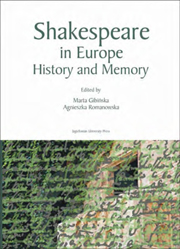Book contents
- Frontmatter
- Contents
- Preface
- Towards a European History of Henry V
- History and Histories
- History and Memory: Criticism and Reception
- History, Memory, and Ideological Appropriation
- Claiming Shakespeare as “Our Own”
- “Must i Remember?:” Hamlet, Memory and Shakespearean Trauma
- Interdisciplinary Shakespeare in the Socialist Republic of Romania. A Comment on Official Censorship and Subversive Practices
- Mingling and Separating in Coriolanus
- “A Goodly House:” Memory and Hosting in Coriolanus
- “Suit the Word to the Action:” Shakespeare's Richard II (2004). A Case of (Meta)Translation?
- “Speak, Memory:” Anniversary Celebrations in the History of the German Shakespeare Society
- Theatre: The Act of Memory and History in the Making
- Index of Authors
“A Goodly House:” Memory and Hosting in Coriolanus
from History, Memory, and Ideological Appropriation
Published online by Cambridge University Press: 05 September 2014
- Frontmatter
- Contents
- Preface
- Towards a European History of Henry V
- History and Histories
- History and Memory: Criticism and Reception
- History, Memory, and Ideological Appropriation
- Claiming Shakespeare as “Our Own”
- “Must i Remember?:” Hamlet, Memory and Shakespearean Trauma
- Interdisciplinary Shakespeare in the Socialist Republic of Romania. A Comment on Official Censorship and Subversive Practices
- Mingling and Separating in Coriolanus
- “A Goodly House:” Memory and Hosting in Coriolanus
- “Suit the Word to the Action:” Shakespeare's Richard II (2004). A Case of (Meta)Translation?
- “Speak, Memory:” Anniversary Celebrations in the History of the German Shakespeare Society
- Theatre: The Act of Memory and History in the Making
- Index of Authors
Summary
Introduction
[Hospitality] is a question […] of right and not of philanthropy. […] it does not arise [relève] from ‘the love of man as a sentimental motive’.
J. Derrida, “Hospitality”What we need is a discussion of benefits and the rules for a practice that constitutes the chief bond of human society; we need to be given a law of conduct in order that we may not be inclined to the thoughtless indulgence that masquerades as generosity, in order, too, that this very vigilance, while it tempers, may not check our liberality, of which there ought to be neither any lack nor any excess.
Seneca, On BenefitsIn conjunction with topics pertaining to what has been variously brought to the fore as a “philosophical anthropology of the gift,” “gift theory,” or “gift studies,” the theme of hospitality or inhospitality has been widely re-discussed in recent years as a way of interrogating our encounter with otherness in the multicultural milieu of our new millennium. Herald of this retrieval is the precious small book by Derrida, Of Hospitality, published in French in 1997.
As a start, however, I will use his introduction to the question in the incisive synthesis we find in “Hostipitality,” an article delivered that same year as a paper at a conference in Istanbul.
- Type
- Chapter
- Information
- Shakespeare in EuropeHistory and Memory, pp. 225 - 238Publisher: Jagiellonian University PressPrint publication year: 2008

